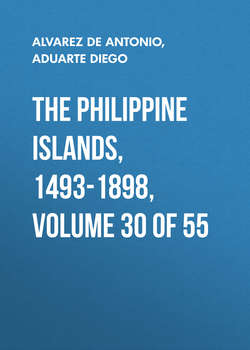Читать книгу The Philippine Islands, 1493-1898, Volume 30 of 55 - Aduarte Diego - Страница 2
Commerce between the Philippines and Nueva España
Оглавление[From Extracto historial.1]
1
The present document is taken from the Extracto historial, a work compiled (Madrid, 1736) by order of the Spanish government, for its information and guidance in the discussions then pending in the royal Council of the Indias upon the subject of the trade in Chinese silks between the Philippine Islands and Nueva España. The book is an historical résumé of that commerce, and of legislation thereon, from its beginning to 1736; it is composed mainly of important documents – decrees, memorials, etc. – from the original sources, and is divided into ten tiempos, or periods, of which the second (which covers the time from 1603 to 1640) is here presented, and the others will receive due attention in later volumes.
The title-page of the Extracto (of which a facsimile precedes the present document) reads thus in English: “Historical summary of the measures now under discussion in the royal and supreme Council of the Indias, at the instance of the city of Manila and the Philipinas Islands, in regard to the form in which the commerce and trade in Chinese fabrics with Nueva España shall be conducted and continued. And for the better understanding of the subject, the important events in that commerce are noted (distinguishing and separating the periods of time), from the discovery of the Philipinas Islands and the concession of commerce to them, with whatever has occurred up to the present in the operation and at the instance of the commerce of España and its tribunal [consulado]. Compiled and arranged by order of the king and the advice of the above-named Council, and at his Majesty’s expense, by an official of the [India] House, from the papers and documents furnished by the office of the Secretary for Nueva España, and [including] other special memoirs, which the said official has here set down for the greater completeness of the work, and to throw more light on the subject. At Madrid: in the printing-house of Juan de Ariztia, in the year 1736.”
The official there mentioned was Don Antonio Alvarez de Abreu; at the beginning of the work he mentions in a prefatory article the reasons for its compilation, and the plan he has followed; he claims to have reproduced accurately the documents presented therein, and to have regarded the interests of both sides in the controversy then being waged over the Philippine commerce. One hundred copies of the Extracto were printed.
